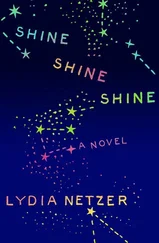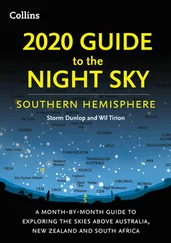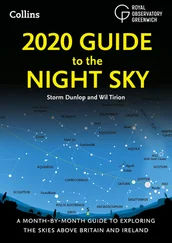“He’s slept with almost everyone around here who has brown hair,” Sam Beth explained impatiently. “Fuck and run.”
“How odd,” said Irene. “Well, that has nothing to do with me.”
“That’s right, but your hair is brown,” Sam Beth said. “Not a good boyfriend for you. Look away. Walk away.”
“Well, I appreciate you trying to look out for me,” Irene began.
“No, I mean really, walk away, walk away from me, right now, don’t talk anymore.”
Irene had walked away, but when she got home and to her computer, in the back room of her mother’s little house, she did a little research and found a few strange Web sites with wall-to-wall text and exclamation points that described Babylon as the “mother of harlots.” Girls in graduate school will believe anything.
“Oh,” said George, in the planetarium. “Those other girls—”
“George, I have a boyfriend, and you … well, you know. All the harlots.”
Irene turned back to her laptop. She felt each breath coming quickly into her lungs, as much as she was trying to control it. She opened a new document and typed “September 5th. Guest Lecture. Nathaniel Lebernov.”
“Who’s Nathaniel Lebernov?” George asked.
Irene turned to face him and said, “The Lebernov differential? You don’t know him? Are you serious?”
She typed the equation on her laptop, her wrists snapping and fingers twisting into shape to make the special characters and punctuation.
“That’s the Lebernov equation.” She typed underneath it. “Did you not read ‘The Spectronometric Analysis of the Geomagnetic Particular Radius of Dectrite Gas Molecules’ in last fall’s International Journal of Physics ?”
George looked at her.
“Are you only here to pick up chicks?” she asked him sternly, out loud.
“Actually, I’m here because of you. I knew you’d be here, and I wanted to see you.”
Irene blinked very fast, forced her chest to stop convulsing. She felt unhinged and didn’t like it at all. She made her feet touch each other at the heels and imagined those heels on the edge of a building, forty stories up. She had to calm her blood down. She took a sideways glance at George, and he was lying back in his seat, looking straight up, utterly relaxed.
“Good afternoon,” said Dr. Miller, taking the podium. “I will waste no time in presenting our speaker for this morning, whose work you all know has been so important to our field. He is a friend of mine, and as such he has agreed to leave his work at the University of St. Petersburg to come and stay with us for a few days, expound on his work, and enlighten us as to his current research. Please welcome Dr. Nathaniel Lebernov.”
Everyone clapped.
Dr. Lebernov took the podium and waved off Dr. Miller, who sat down in the front and leaned way back, rolling his eyes up toward the ceiling. George did the same. Irene sat up straighter, her hands on the keyboard. Then Dr. Lebernov himself raised his eyes upward to the sky, taking in a big breath.
“The universe, my friends, is spinning. Spinning fast, beyond our control,” he said. “We look up at the stars, we see them flare and fade, and we are afraid.”
“He’s talking about you guys, not him,” said Dr. Miller, calling out without a microphone, “He’s not afraid.”
Dr. Lebernov made a shushing gesture with his hands and continued.
“My friends, we are all afraid of what we do not know. We are afraid of what we cannot clearly see. Of uncertainty, and chaos, and unexpected things we had no chance to predict. Chance collisions scare us, and explosions in our backyards, our heads being torn off our bodies by a sudden gust of stellar wind. What might happen to us in the future? What rock might plummet from the sky? How might we change, in an instant, forever, only because of chance? There is nothing we can do about it. No way to protect ourselves. As long as we have only these”—and he pointed to his eyes—“which are all most people have.”
“They have their eyes, and they can stare up into the sky. They know now that the stars are distant. They have a vague idea that the universe is large. They know that giant clouds of gas are burning, that rocks the size of Belgium hurtle around like bullets, and they know that they are tiny, and everything else is big, and that’s scary.
“Sometimes I wish,” he went on, “that people would still believe the earth is flat, the sun is a lightbulb behind some paper board, the stars gods.”
“Some people do,” whispered George to Irene. His breath in her ear.
“Wouldn’t that be easier?” said Dr. Lebernov. “Chaos is the most frightening phenomenon. Order, even malicious order, is at the least predictable. But the cruelty of chaos is murky, malignant in its expanse. Reason may be harsh, and difficult, but it is defensible. So in the absence of agency we create agency, in the absence of information we create myth, and we created gods to rule the heavens so that we know what is there.”
Irene snuck a glance at George and noticed he was listening to the lecture. He still had his head thrown back in a posture of disregard, but his eyes were open. He was still awake.
“But then the astronomers came and put the gods out of business. Set the sun aflame, scattered the stars across the universe, made the earth into a ball. In this crusade, we have one friend. This is mathematics.”
George leaned over and put his fingers on Irene’s laptop and typed the words “this is crap” before she pushed his hands away. “Don’t do that again,” she typed back. His fingers were long, his knuckles reddened and rough, as if he were a longshoreman instead of a physicist. Those hands felt strong when she pushed on them, and in a comforting way: they were warm and tough. She wished that he would put them back. She wanted to watch them flicking over the keys of her laptop, writing more letters, more words to her.
“Math dispels ignorance. Math conquers discord, and anarchy, and revolution. It is math that says 6.3184 times ten to the third. Math will see us through.”
George made gagging noises in his throat and shut his eyes. She felt free, with his eyes shut, to look at him, to think about touching him, about tearing at him, about striking her hands against his wide collarbones, being encircled in his long arms. I want to take my clothes off, she thought. I want to be naked for him, press up on him, naked as a clam. I want this. She had never, ever wanted this before. And this was why she couldn’t stop looking at George, all through the lecture. She was surprised to be wanting him. It wasn’t like expecting a red circle and finding a blue one. It was more like unfolding an envelope and finding water. Looking into a hole and seeing the sky. She didn’t know when she had been so surprised.
After it was over, she snapped her laptop shut and said, “Well, Dr. Dermont, thanks to you my notes for today consist of the word ‘crap.’ And here I thought you would only impede my work if I dated you.”
“You could have taken notes,” he said. He stood up.
“That’s true,” she said, relenting. “And anyway, I probably wouldn’t have taken notes. Most of that lecture is in his published work, here and there, if you piece it together. If you take the spirit of the thing.”
“I thought we weren’t supposed to take the spirit of the thing. I thought we were to singe the spirit into a blackened pile of ash and then count every molecule in the pile and call that the answer. Isn’t that what he just said?”
“George, you’re a dreamer, I’m afraid,” she said, throwing her laptop bag over her shoulder and letting him out of the row of seats. She gave him a smile. She reached out and took his hand. It was almost as if her body acted on its own, and before she knew it she was holding one big hand of his in both of hers, and the bones inside it were moving around, pulled and pressed by all his soft tissue, and she grabbed it, and held it, and then dropped it as if it had become too hot.
Читать дальше












